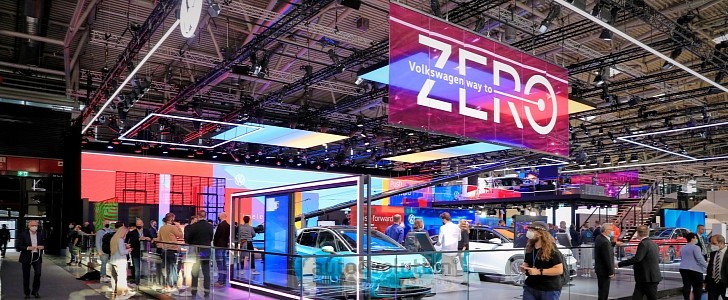On July 16, we shared with our readers that Volkswagen’s closed-loop approach seemed to have a flaw. The company said it would recycle its battery packs as if it owned them even after selling its EVs to customers. On July 23, Volkswagen told us it had a plan to tackle that: offering incentives for customers to return them. At the IAA 2021, the company disclosed another strategy: leasing used EVs instead of selling them.
Herbert Diess shared this strategy with journalists that got to talk to him in a mini-press conference at the German motor show. According to Automotive News, the Volkswagen CEO said the company is willing to do second or even third leases with its electric vehicles. That would allow the company to keep the cars and the battery packs.
According to Diess, battery packs will last longer than the car, and they are precious components. When they are no longer usable in vehicles, battery packs can be converted into stationary energy storage devices. When that second-life use is not possible anymore, these cells can still be recycled and converted into new batteries. Volkswagen will need as many of them as it can buy to meet its current EV production targets.
For customers, the real advantage will be to make the transition at more affordable prices. According to the Volkswagen CEO, EVs will have higher residual values due to battery packs. The lower the depreciation, the more money leasing customers have at the end of the contract.
In other words, leasing a used EV will be a no-brainer. It will give people afraid of buying an EV the peace of mind of driving a vehicle with no risk of needing to replace an expensive battery pack.
On top of that, when the leasing ends, the higher residual value will allow customers to lease more expensive cars. For Volkswagen, that will also be handy. With buyers preferring to lease a new car instead of buying the used one, it will most certainly keep the old EV and its battery pack.
Although this is not even close to the proposition Riversimple will make with its cars, it approaches Volkswagen to mobility as a service. Customers will pay to drive the EVs, not to own them. Selling them will become less and less Volkswagen’s core business – and everybody else’s, to be quite frank.
According to Diess, battery packs will last longer than the car, and they are precious components. When they are no longer usable in vehicles, battery packs can be converted into stationary energy storage devices. When that second-life use is not possible anymore, these cells can still be recycled and converted into new batteries. Volkswagen will need as many of them as it can buy to meet its current EV production targets.
For customers, the real advantage will be to make the transition at more affordable prices. According to the Volkswagen CEO, EVs will have higher residual values due to battery packs. The lower the depreciation, the more money leasing customers have at the end of the contract.
In other words, leasing a used EV will be a no-brainer. It will give people afraid of buying an EV the peace of mind of driving a vehicle with no risk of needing to replace an expensive battery pack.
On top of that, when the leasing ends, the higher residual value will allow customers to lease more expensive cars. For Volkswagen, that will also be handy. With buyers preferring to lease a new car instead of buying the used one, it will most certainly keep the old EV and its battery pack.
Although this is not even close to the proposition Riversimple will make with its cars, it approaches Volkswagen to mobility as a service. Customers will pay to drive the EVs, not to own them. Selling them will become less and less Volkswagen’s core business – and everybody else’s, to be quite frank.




















